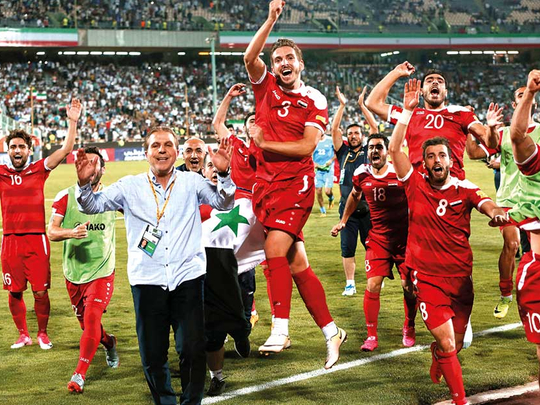
London: Syrian midfielder Zaher Midani and his colleagues will have more than football on their mind in tonight’s first leg World Cup playoff against Australia.
“We have a huge motivation: to make the Syrian people happy,” Midani said. “The players and management hope we’ll be able to unify our people.
“Australia may have many big-name players known for their individual talents. But we have the enormous potential that comes from performing as a group.”
Syria have never been so close to a maiden World Cup berth.
On a shoestring budget and shackled by security concerns that deny them from hosting home fixtures on home soil, the world No75 nation has toppled several rivals that boast significantly greater pedigree and pay cheques.
It has all the trappings of a fairytale, a Cinderella story, of a country ripped to shreds by civil war finding hope in the all-uniting power of sport.
Last month, when Omar Al Somah scored a sensational stoppage-time equaliser against Iran to snatch Syria’s historic first World Cup play-off spot, thousands of jubilant fans danced on the streets of Damascus in a rare celebration.
However, that the giant public screen on which they watched was erected by president Bashar Al Assad’s dictator government underlines the very reason Syrians are so painfully divided over what their national team represents.
Detractors say the team normalises and legitimises the regime’s myriad atrocities while sweeping under the carpet the killings, disappearances and detainments of professional football players.
The government stands accused of using the team as a propaganda tool, another weapon against its own people.
The allegation was epitomised in 2015 when then Syria coach Fajr Ebrahim attended a press conference wearing a T-shirt emblazoned with Al Assad’s image.They’re all factors that informed captain Firas Al Khatib’s decision in 2012 – along with teammate Somah – to boycott the national team until the country stopped bombing its civilians.
Five years later the 34-year-old—widely considered Syria’s greatest player—accepted a call to return for the Russia 2018 push, but betrayed signs of a man trapped between a grim divide.
“I’m afraid, I’m afraid,” Khatib told ESPN in May. “What happened is very complicated, I can’t talk more about these things.”
“Better for me, better for my country, better for my family, better for everybody if I not talk about that. Whatever happen, 12 million Syrians will love me. Other 12 million will want to kill me.”
Indeed, when half a nation’s population is displaced, the chasm cannot expect to be fixed by a sporting team mired in such deep moral conflict.
Regardless, the unlikely success has provided welcome respite to both regime backers and opponents.
Some, like Wafi Al Bahsh, who runs a football club in the rebel-run Eastern Ghoutan near Damascus, attempt to reconcile their feelings by separating sport and politics.
“My dream is to see Syria qualify for the World Cup,” he said. “This team is not Al Assad’s team, it’s Syria’s team.”












